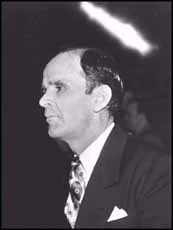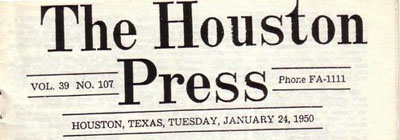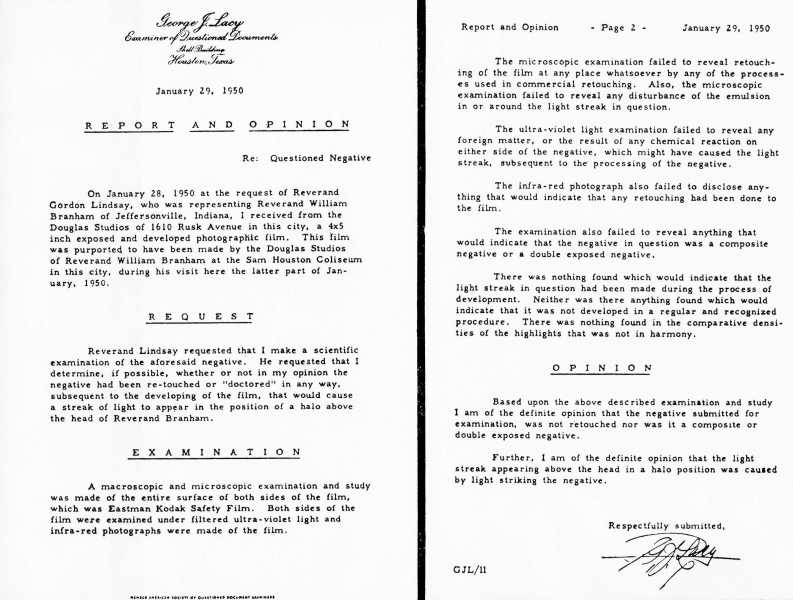The Houston Photograph: Difference between revisions
No edit summary |
|||
| Line 2: | Line 2: | ||
| | | | ||
[[Image:Pillar_of_Fire_smallpic.jpg|frame|Picture taken in Houston, TX by Douglas Studios on January 24, 1950]] | [[Image:Pillar_of_Fire_smallpic.jpg|frame|Picture taken in Houston, TX by Douglas Studios on January 24, 1950]] | ||
In Houston, Texas, on January 24, 1950, | In Houston, Texas, on January 24, 1950, a strange photograph was taken by the Douglas Studios. In the photograph, there appeared a halo-like light above the head of Rev. [[William Branham]]. Gordon Lindsay took the negative to George J. Lacy, Examiner of Questioned Documents (who had acted as an external specialist for the FBI). George J. Lacy was asked to determine whether or not the light could have been the result of improper exposure, developing or retouching. This investigation concluded that the unusual brightness was caused by light striking the negative. | ||
| Line 28: | Line 14: | ||
Immediately following the meeting Mr. Ayers went to the darkroom of his studio to develop the negatives that had been exposed. He was surprised that over the head of Rev. Branham, was apparently a supernatural halo of light. Mr. Ayers and others who viewed the photo were puzzled by the presence of what appeared to be a halo of light. | Immediately following the meeting Mr. Ayers went to the darkroom of his studio to develop the negatives that had been exposed. He was surprised that over the head of Rev. Branham, was apparently a supernatural halo of light. Mr. Ayers and others who viewed the photo were puzzled by the presence of what appeared to be a halo of light. | ||
==Scepticism== | |||
George J. Lacy's report did not comment on whether the source of the light was natural (i.e. electric indoor lighting) or supernatural. While newspaper articles about the Coliseum around that time show that there were flood lights in the building (including photographs of a concert by the Beatles), William Branham claimed that this was a supernatural light. | |||
Some observers note that if the pillar of fire was directly over William Branham's shoulder, it would have cast light on top of his head and the pulpit. Instead, the top of his head is not lit and the light appears to be from a source beyond William Branham. If the light was not from indoor lighting, it may have been the result of the flash from the camera reflecting off a metal pole or beam in the background. | |||
==Local newspaper reporting== | ==Local newspaper reporting== | ||
Revision as of 18:44, 19 July 2013
|
In Houston, Texas, on January 24, 1950, a strange photograph was taken by the Douglas Studios. In the photograph, there appeared a halo-like light above the head of Rev. William Branham. Gordon Lindsay took the negative to George J. Lacy, Examiner of Questioned Documents (who had acted as an external specialist for the FBI). George J. Lacy was asked to determine whether or not the light could have been the result of improper exposure, developing or retouching. This investigation concluded that the unusual brightness was caused by light striking the negative.
Facts surrounding the pictureIt was during the Houston campaign in 1950, that a skeptic, Rev. W. E. Best, who opposed divine healing, became hostile against Rev. Branham and F.F. Bosworth (who spoke during many of the day services) teaching on the subject of divine healing. The hostile clergyman issued a public challenge through the newspapers, to debate with Rev. Bosworth on the subject of "Divine Healing Through the Atonement." Rev. Bosworth asked and received Bro. Branham's permission to accept the challenge. Bro. Branham cautioned Brother Bosworth against being argumentative over "the Word". The whole matter was given front-page publicity in the Houston newspapers. The January 24th, 1950 issue of The Houston Press hit the news stands with the headline: "Baptist Cleric To Challenge 'Miracle Man'". As the debate got under way, it was quite apparent that the sympathy of the vast audience was almost entirely on the side of the visiting evangelists. Large numbers of members from the same denomination as Rev. Best stood to their feet as witnesses that they believed in Divine healing and had in fact been healed. This sentiment became increasingly evident throughout the service. To record what he thought would be a great milestone in his career, the opposing Rev. Best secured the services of Mr. James Ayers and Mr. Ted Kipperman, professional photographers from Douglas Studios in Houston. They were to take a series of pictures of him while he was speaking. After taking several photos of Rev. Best, the photographer snapped only one picture of Rev. Branham, who spoke briefly just before the service closed. Immediately following the meeting Mr. Ayers went to the darkroom of his studio to develop the negatives that had been exposed. He was surprised that over the head of Rev. Branham, was apparently a supernatural halo of light. Mr. Ayers and others who viewed the photo were puzzled by the presence of what appeared to be a halo of light.
ScepticismGeorge J. Lacy's report did not comment on whether the source of the light was natural (i.e. electric indoor lighting) or supernatural. While newspaper articles about the Coliseum around that time show that there were flood lights in the building (including photographs of a concert by the Beatles), William Branham claimed that this was a supernatural light. Some observers note that if the pillar of fire was directly over William Branham's shoulder, it would have cast light on top of his head and the pulpit. Instead, the top of his head is not lit and the light appears to be from a source beyond William Branham. If the light was not from indoor lighting, it may have been the result of the flash from the camera reflecting off a metal pole or beam in the background.
Local newspaper reporting
The same morning that the photographer brought the news of the halo of light in the picture above Rev. Branham's head, the Houston newspapers carried full reports of the service on their front pages. Of course, the newspapers had heard nothing yet about the photograph. And it is interesting to note that Mr. Ayers, one of the photographers who had been secured by the opposing clergyman, himself had made skeptical remarks - which remarks were included in the reports by the newspapers. Below we include some greatly condensed reports of the meeting as they appeared that morning in the Houston newspapers: THE HOUSTON CHRONICLE - JAN. 25, 1950 (Abridged)
AuthenticationAfter conferring with Rev. Branham, Gordon Lindsay arranged for the negative to be turned over to George Lacy, a forensic examiner of documents. Mr. Lacy examined the negative. After his examination, Mr. Lacy gave a certified statement indicating that it was his opinion that the negative was genuine, and had not been "doctored" or retouched or the result of a double exposure. Today, the picture sits in a filing cabinet in the U.S Library of Congress in Washington, D.C. [1] |


